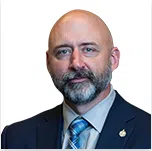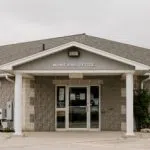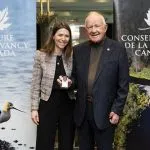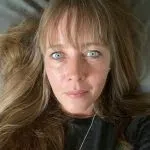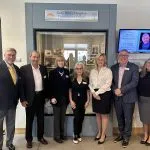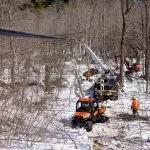Bruce-Grey-Owen Sound Conservative MP Alex Ruff is highlighting some key issues and efforts from his perspective in federal politics this past year.
In a year-end recap of highlights and challenges, Ruff says, “The affordability and housing issues are the biggest things that I heard from constituents, frustration with that. The ability to put food on the table and to get by is something that’s consistent from a messaging perspective.”
He says key issues he was directly involved with include working on a foreign interference report as a member of the National Security and Intelligence Committee of Parliamentarians (NSICOP). He says, “I don’t know if I’ll ever have the privilege of being involved in a more important report in my political career. We recognize that right off the bat, this is something we needed to highlight and get out in the public eye and addressed to government in a non-partisan fashion,” says Ruff, noting everything on that 11 person committee is unanimous. “There has never been a vote in the history of that committee, everything that gets put in that public report is unanimously supported by the members of the committee,” says Ruff.
Meanwhile, after a few years of working with a non-partisan group of MPs, Ruff also helped to bring a number of Afghan women who were members of that country’s parliament to Canada.
Ruff is a retired colonel in the Canadian Armed Forces who served two tours in Afghanistan (2007, 2012). He says it’s been an all party effort. Since the Taliban took over Afghanistan in 2021, they have imposed increasing restrictions on women, and the group of Canadian MPs had been voicing concern for those former Afghan MPs. In January of 2023 one former female MP, Mursal Nabizada was murdered in her home.
This year, the group of MPs welcomed a number of them to Canada including the family of Mursal Nabizada.
Ruff says, “It was nice to see the majority of them…we’re not 100 per cent successful, but it was really nice to see and be able to participate with Mursal’s mother that got into Canada in the September timeframe to be able to go to the airport and meet her with some of my other colleagues that were part of that all-party team, and to have a bit of success there after a lot of hard work behind the scenes.”
Ruff introduced a private members Bill C-377 on security clearances this year, which hasn’t yet reached its third reading stage. He says, “Likely not going to cross the finish line, but still I learned a lot about that process, just as important for any member of parliament to understand.”
Ruff says another highlight of 2024 has been receiving nominations for people in the community to become recipients of the King’s Coronation Medal, noting, “It’s another opportunity to recognize some great work done by local constituents.”
Another issue he’s been working to resolve are the fines and penalties members of the Amish and Mennonite communities were hit with for traveling or not having the right documents during the pandemic.
Ruff says there’s been some good news on that front, explaining, “I’ve been highlighting my perspective about the unfair practices that targeted our local Amish community with respect to pandemic measures.” He explains, most of them are dual Canadian/American citizens who were crossing the border. He argues they weren’t properly provided information about restrictions. He says because of local advocacy, Democracy Fund Canada got involved and raised some money for them to pay for lawyers. Ruff says, “They’re a community that doesn’t hire lawyers, they’re pacifists, they don’t vote, they’re not really into fighting, but to see them get a little bit of progress there so the liens were against some of the properties from my understanding have been all dropped and they’re now being given that opportunity to continue to challenge these fines that amounted to over $300,000.”
He also took on an executive role with the Canadian NATO Parliamentary Association in 2024. Ruff says, “I was able to participate back in February of this year in Belgium as the NATO parliamentary assembly.” He notes Canada hosted it in November in Montreal, adding, “We continue to try to highlight the importance of continued support for Ukraine against Russia’s illegal invasion into that sovereign nation.”
2024 has turned out to be an interesting year in Ottawa, with regular debate in the House of Commons being held up by the issue of the government refusing to release some documents related to Sustainable Development Technology Canada. In the summer, Auditor General Karen Hogan released a report saying the arm’s length, taxpayer funded SDTC violated conflict of interest rules 90 times. The government says a committee should decide what will be released. The opposition Conservatives say the documents should be released and they want the RCMP to investigate SDTC. While parliamentarians have debated what to do about the matter, regular debate hasn’t been prioritized.
Meanwhile, in October, about 20 liberal MPs signed a letter calling for a change in their party leadership. In December, Finance Minister Chrystia Freeland resigned from the liberal cabinet after learning she was to be moved to another ministerial position. The conservatives and Bloc Quebecois said it signalled the Prime Minister’s loss of control over his government, and Freeland’s resignation also prompted an increasing number of liberal MPs to voice the opinion Justin Trudeau should step down as party leader. Now, the Atlantic, Ontario and Quebec liberal caucuses have called for new leadership.
When parliament resumes, NDP leader Jagmeet Singh has said he’ll move a non-confidence motion to bring down the government and trigger a federal election. The Conservatives also say they will move a motion of non-confidence sooner than that, at the next Public Accounts Committee meeting.
All things considered, Ruff says, “It’s been a very interesting year in the House of Commons from the chaos, so some unique, historical events literally on just the way things have gone down. Especially this past three or four months, so it hasn’t been boring in 2024.”

